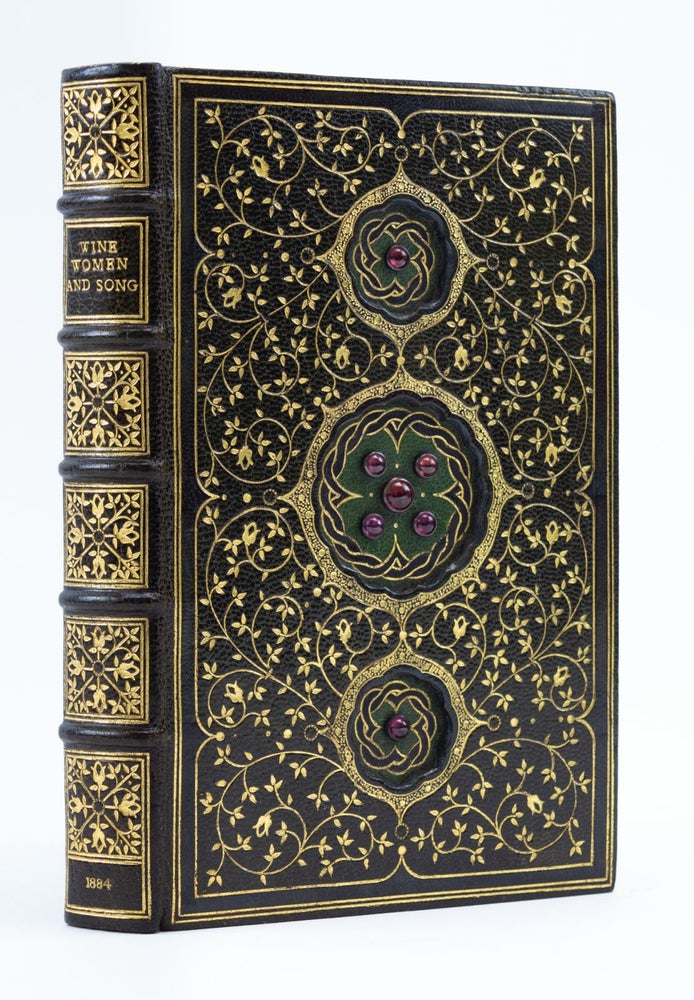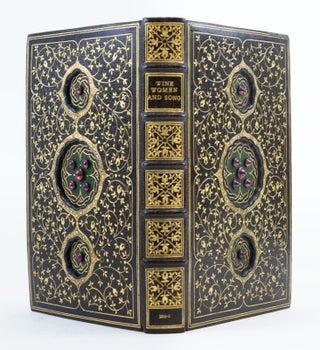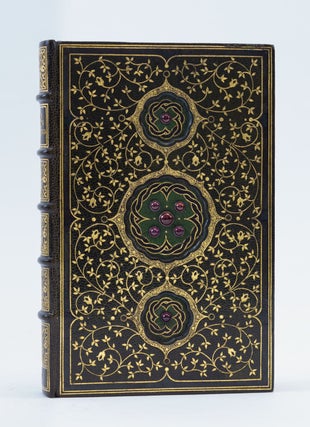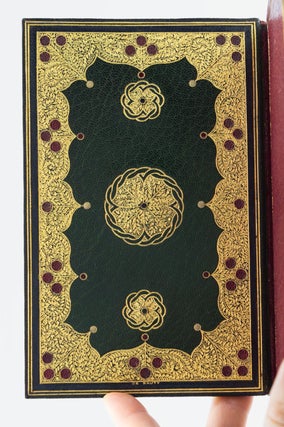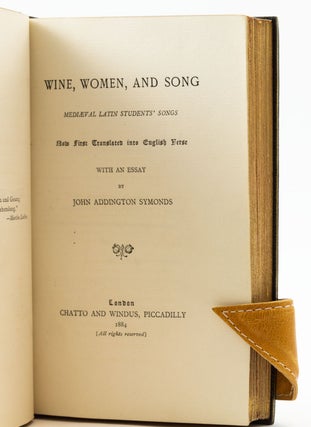WINE, WOMEN, AND SONG: MEDIÆVAL LATIN STUDENTS' SONGS NOW FIRST TRANSLATED INTO ENGLISH VERSE.
(London: Chatto & Windus, 1884). 170 x 111 mm. (6 5/8 x 4 1/4"). 4 p.l. (first blank), 183, [1] pp.With a preface and explanatory notes by Symonds. FIRST EDITION.
LOVELY DARK GREEN MOROCCO, ELEGANTLY GILT, INLAID, AND BEJEWELLED, BY ALFRED DE SAUTY (stamp-signed on front doublure), covers with double gilt fillet border, central panel with myriad swirling vines emanating from three recessed medallions, all with light green backgrounds inlaid with an interwoven strapwork wreath in dark green morocco and gilt, the larger medallion at center set with five cabochon garnets, the smaller medallions above and below it set with one, all three enclosed by pointillé gilt frames, raised bands, spine compartments with gilt tulips and leaves radiating from a central circlet, gilt titling, ESPECIALLY BEAUTIFUL DARK GREEN MOROCCO DOUBLURES with three gilt medallions framed by strapwork and densely tooled with leafy fronds on a mille-point background, these enclosed by an undulating frame similarly gilt-tooled and inlaid with circles of red or ivory morocco (a total of 64 large and 12 small round inlays on the doublures), crimson morocco free endleaves, all edges gilt. In a silk-lined, morocco-backed green clamshell box, its back with raised bands, and inlaid red morocco circles tooled with a gilt flower in the panels. ◆A FLAWLESS COPY, inside and out.
A selection of satirical 12th and 13th century songs mocking the sanctimonious and praising riotous living, "Wine, Women, and Song" is offered here in an exuberant binding that, like the verses, celebrates beauty, opulence, and pleasure. One of the most accomplished binders at work in the first third of the 20th century, Alfred de Sauty (1870-1949) was the son of an engineer who had studied that discipline himself before taking up bookbinding, and he brings an engineer's precision to his handiwork. He not only possessed enormous technical skill (he made his own tools), but also had a refined imagination for design. He began his career as a finisher for the renowned Riviere bindery, and after leaving their employ in the late 1890s, he worked as a designer at the Hampstead bindery; in her essay "The Mysterious Mr. De Sauty," binding authority Marianne Tidcombe observes, "De Sauty was responsible for some of the best designs of the two binderies, and carried out all the stages of the craft himself, from sewing to the designing and exceptionally delicate tooling of the covers." In his "Styles and Designs of Bookbindings from the 12th to the 20th Century," Nixon features a binding similar to this one in the techniques employed--particularly the intricate gold tooling on the doublure--as an exemplar of De Sauty's work, citing it as "a most accomplished piece of finishing." He further notes that De Sauty's "finishing was of a very high standard and he was a patient and careful worker." Prideaux praised De Sauty in her "Modern Bookbindings," saying that "his inlays are distinguished for the taste shown in the association of colours, and his finishing has some of the brilliant qualities of the French school, seen particularly in the finely studded tooling of which he seems particularly fond." In 1922, De Sauty left England for America: he had been recruited to become the manager of the Extra Bindery at RR Donnelly Co. in Chicago, where he did much to raise the standards of hand bookbinding in the United States. The verses here were composed in Latin by a wandering group of students and young clerics known as the Goliards. Primarily made up of younger sons from wealthy families forced into careers in the church by the laws of primogeniture, these rebellious youths had little interest in an ascetic religious life and took to the roads of England, France, and Germany as bands of singers and entertainers. Their songs mock Church hypocrisies and celebrate the sensual pleasures of a worldly existence. An accomplished scholar whose career advancement was blocked because of his sexual orientation, Symonds is best known today for writing the first account of homosexuality in English and for his open and early advocacy for acceptance of homosexuals in Great Britain. (ST18397)
Price: $16,000.00

